Jason Micheli's Blog, page 55
January 6, 2024
Missing By Nine Miles

Tamed Cynic is a reader-supported publication. If you appreciate the work, consider joining the posse of paid subscribers!
Epiphany: Matthew 2
“The star of Bethlehem was not an ordinary star, for no other star has this capacity to guide, not merely to move but to beckon and invite...The star remained after bringing them to the place, in order that the child might also be seen. For there is nothing conspicuous about Christ. The inn was ordinary. The mother was ordinary. The star needed to manifest and illumine the ordinary until they had reached their destination.”
- John Chrysostom
When I first sat down on the plane, I did what any right-thinking person does. I began thumbing through the pages of SkyMall. A Kenny G musak cover of Van Morrison’s ‘Crazy Love’ played- barely audible- over the speakers as the throng of travelers stepped on board and stowed their stuff above them. Across the aisle, caddy-corner to me, a boy who looked to be in the third or fourth grade was wailing loud enough to make the veins in his neck pop out.
His mother had her arm around him and was saying shush but the boy was inconsolable. He stomped his feet and screamed at the top of his lungs: I don’t care how much pumpkin pie Grandma’s made I don’t want to fly. Behind me, a woman argued with her husband: All I know is that if your mother treats me like she did last Thanksgiving this year I won’t keep my mouth shut. On my right, on the aisle side, a teenage girl was smacking her gum and blowing bubbles. On her lap she had opened a copy of Seventeen magazine. She was reading an article about teens and plastic surgery and how to know how much is too much.
Sitting on my left, a middle-aged man in an expensive-looking suit was barking orders into his Blackberry- seriously a Blackberry. He had a Wall Street Journal as well as a Financial Times folded underneath his arm and a leather tote overflowing with papers on his lap.
He had what sounded like some sort of Eastern accent- Boston maybe- and he smelled so strongly of man-perfume that I couldn’t help but wonder if his musk had real bits of panther in it. He kept barking instructions into his phone until the stewardess came over and shot him a stern look and told him we were getting ready for takeoff. And there I was, the happy holiday traveler, stuck in the middle of Bernie Madoff and Miley Cyrus.
While we waited for take-off I thumbed through the Christmas 2014 edition of SkyMall where, among other things, I discovered that the $90.00 Star Wars-themed Chewbacca sleeping bag actually comes in adult sizes.
Is there a better way to celebrate Christmas? The glossy advertisement asked rhetorically.

I had an early morning flight. The sky was still dark enough that when we were in the air you could see the stars. The fasten seatbelt sign chimed off and the captain came on and spoke reassuringly over the intercom about every angle and altitude of our journey ahead. Not that you could hear him over the boy who was still wailing and still stomping his feet and who’d started to hyperventilate.
Once we were in the air, the girl to my right had moved on to read an article about eyeshadow.
Seriously. Eyeshadow.
And the woman behind me- though it sounded like she was actually in my ear canal- was giving a blow-by-blow recount of the last holiday she’d had to spend with her husband’s mother.
Having had many of these same conversations with my own wife, I didn’t bother to turn around. Even without looking, I knew her husband was looking sheepish and emasculated, and probably gritting his teeth in a ‘serenity now’ kind-of-way.
Where you headed? The businessman on my left asked.
And I thought to myself: Well, it says Atlanta on my ticket but it feels like I’m already half-way to Hell.
I’m headed to my in-laws’ house.
He chuckled and said: Good luck.
Now, I don’t like to talk to people on airplanes. It’s not that I’m unfriendly or shy. It’s just that I learned early on in my ministry that there are certain situations in which revealing to a stranger that I’m a pastor can provoke interminable, unwanted conversations.
And I’ve discovered the hard way that sitting on an airplane in between strangers can be just like that. Ironically, though, I’ve learned that one of the best ways to avoid conversation with strangers on planes is by taking a bible out of my bag and simply opening it up on the tray table in front of me.
You don’t even have to read it necessarily. You can just leave it open like a force field of personal space. Religious people will think you’re doing your devotions and will respect your privacy and non-religious people won’t say anything for fear you’re Baptist and might evangelize them. And if you really want to make sure no one bothers you, just open it up to the Book of Revelation along with the current issue of Guns and Ammo.
Stops them every time.
That morning I thumbed through SkyMall and I had my bible out and opened, not to Revelation but to Matthew 2- not only to stymy potential conversation with the businessman to my left but also because Advent was ahead and I thought I’d jot down some sermon notes while I had the chance.
Meanwhile the businessman sitting next to me pulled out his laptop and then he dug deeply into his leather briefcase and pulled out a stack- at least 12 inches thick- a stack of catalogs: Eddie Bauer, LL Bean, Pottery Barn, Williams Sonoma etc. He pored over them like he was reading an ancient map. Every now and then he would look up from them, marking a spot on the page with his index finger, and then he would type quickly into his laptop. I watched him do this several times before I realized what he was doing. He had Excel opened up on his computer and he was building a Christmas shopping spreadsheet. He was typing in the name of the item, the cost, the person who would receive the gift and then a hyperlink to the company’s website. Every now and then he would click the ‘Sum’ button on the screen, giving him a grand total cost for his 2014 Christmas. I watched him do this a while. Then I went back to thumbing through the Christmas issue of SkyMall where I saw that I could get a replica Mockingjay pin, like the one worn by Catniss Everdeen in the Hunger Games, for only $80.00.
I was just thinking to myself who in their right mind would pay that much money for a fake Mockingjay pin when the guy sitting next to me said: Hey, can I see that a minute? My nephew would love that. I watched while he typed all the information into his spreadsheet. His nephew’s name was Brian. He handed SkyMall back to me and with his tiny travel-sized mouse he clicked Save.
After he finished, he let out a deep, exhausted sigh. And he said: It’s the same every year. This can’t be what it’s all about. Can it?I looked over at him. You talking to me? I said as the fingers of my right hand deflty felt over my bible for the Book of Revelation.

You talking to me? I asked.
Yeah, he said.
Are you religious, he asked, and nodded at the bible on my tray.
Yeah, I guess so.
That’s good, he said in an absent sort of voice. I’m not, never have been.
I let his voice of trail off.
A few moments passed and he asked what I was reading, in the bible.
It’s the story of the magi, I said. He just blinked at me like a deer in headlights.
The what?
The wise men, I said.
He said: Right, I know what you’re talking about. I’ve seen them in those displays in people’s yards. They have the turbans and the camels right? They’re the ones who follow the star to the manger?
Not exactly, I said. They go to Jerusalem first not the manger in Bethlehem. It’s close but they’re off by about nine miles.
Sounds like they must’ve let their wives drive, he laughed.
I thought that might be the end of it. I was just about to turn to Revelation or pull out Guns and Ammo or pretend I was asleep.
But then he asked me: Why do they go to Jerusalem first?Well, they were looking for a King. The magi were just like us: educated, rich and sophisticated. They came from a powerful nation.
They went to Jerusalem first because they just assumed any ‘King’ worth their worship would be found at the center of money and might.
He smiled a wise smile at me and said:
“In other words, they thought they could celebrate Christmas by traveling, giving a few gifts and then getting back to their normal lives.”
And I smiled and said: Something like that.

Outside the window the stars were starting to fade against the oncoming sunrise. The boy across from me was hyperventilating into a vomit bag. The woman behind me was giving her husband the silent treatment. And the girl next to me had fallen asleep reading 50 Shades of Grey, with a half-blown bubble of gum spread across her bottom lip.
The man next to me sat up and turned towards me.
“Can I read it?” he asked.
Well, you’ll have to ask her when she wakes up, I said, but I don’t think that’s the kind of book you borrow from someone.
No, not that book, he said.
And he held out his hand for my Bible. So I handed it to him. I pointed out the first part of chapter two: It’s this part I said.
He took a while with it. He must’ve read it several times, searched over the words as though they contained the universe.
When he was done, he turned a few pages further into Matthew’s Gospel and then he turned a few pages back. Then he turned it over and gazed at the back cover and then the front cover, gazing at the cheap, beat-up bible like it was a talisman or a treasure. Then he held the bible out to me and he put his index finger down at the page. What’s this? he asked me.
He was pointing to the poem indented in Matthew’s Gospel text:
And you, Bethlehem, in the land of Judah, are by no means least among the rulers of Judah; for from you shall come a ruler who is to shepherd my people.
That’s from Micah, I said, from the Old Testament.
Can you show me? he asked.
And I flipped back into the Old Testament until I found Micah, the peasant prophet, and handed it back to him. It’s short, I warned, only a few pages long. I watched him read it, gazing over the constellation of words. I saw him furrow his brows intensely at times and wondered what he might be reading.
I wondered if it might be:
He will teach us his ways so that we might walk in his path.
or
He will judge between many peoples.
or
Nations will beat their swords into plowshares and their spears into pruning hooks. Nation will not lift up sword against nation nor will they train for war anymore.
or
He will gather the lame and assemble the immigrants and all those who grieve.
or I wondered if it might be
With what shall I come before the Lord?
Will the Lord be pleased with thousands of rams,
with tens of thousands of rivers of oil?
(in other words, will the Lord be pleased with all my stuff)
What does the Lord require of you but to do justice, and to love kindness, and to walk humbly with your God?
When he finished reading, he just sat holding it for a while. Then he handed it back to me. A few minutes passed before he closed his laptop and said: That’s quite a gift you know.
The Mockingjay pin? I asked.
No, he said, the wise men.
For the wise men to be able to reorient everything they knew about the way the world worked.
For them to be able to look at a helpless baby in a poor woman’s arms in a little village, for them to believe he’s the one, the only one, they should honor, for them to believe he’s the one to make Micah’s words come true- for them to able to do that, it’s got to be a gift from God. I guess I never thought about it like that, I said, even though, now that he’d said it, I could think of an ancient Church Father who’d written something very similar.
I travel a lot, he said. I don’t get to see my family much. Every year I try to make up for it at Christmas. I search to find just the right gifts, but lately I feel like I’m always looking in the wrong places.
The Good News is so were the magi, I said.

We started our descent. The stars had leeched and disappeared in the sky. The sun was coming up through the windows.
I’d closed my eyes.
I thought that story was supposed to have shepherds and angels in it, he said.
That’s Luke’s Gospel, I said. Matthew says everything he wants to say about Christmas with the wise men.
I guess we’re more like the wise men anyway, he said.
How so?
None of us have angels telling us what to do or making things easier for us. We’ve just got to search, and, when we find what we’re searching for, decide whether or not we’ll let it change us.
You ought to be a minister, I said.
He laughed and said: I don’t think so. Aren’t ministers all dull and creepy?
I laughed and said...pretty much.

As we were getting off the plane, the journey over, I asked him: Are you going back to DC after the holiday?
No, he said, I’ve made some commitments. I’m going home a different way.
 Get more from Jason Micheli in the Substack appAvailable for iOS and AndroidGet the app
Get more from Jason Micheli in the Substack appAvailable for iOS and AndroidGet the app
January 5, 2024
Top Theology Books 2023, Radio Sermon, & Fleming Rutledge Study

Tamed Cynic is a reader-supported publication. If you appreciate the work, consider joining the posse of paid subscribers!
Merry Christmas,
Tomorrow is Epiphany. For those of you without expensive seminary educations, Christmas is twelve days long because that’s the approximate amount of felt time it takes to sing all the verses of “We Three Kings.”
Everyone knows the magi bring Mary’s boy frankincense, gold, and myrrh.
Every Christian should know with even more certainty the gifts Mary’s boy gives to believers by way of baptism: his righteousness.
His permanent, perfect record.
So, as a friend says, “Enjoy your forgiveness.”
Here are a few odds and ends happening that I wanted to drop here for you:
My Book Made the List!
Mockingbird recently named my book, A Quid Without Any Quo, as one of the Top Ten Theology Books of 2023.
I’m flattered to be on any list that includes Gerhard Forde.
Here’s the review:
Day 1 Radio SermonAnyone who has heard his sermons (or read any of his many contributions to Mbird), knows that Jason Micheli has the unique ability to simultaneously capture the offensiveness and freedom of the gospel — all the while bowling you over with captivating stories and illustrations. These reflections on Galatians are no exception! Much ink has been spilt debating over Paul’s explosive letter, but Micheli goes for the heart of it with winsomeness and radical clarity.

I had the honor of preaching the Christmas Eve sermon for Day 1, formerly the Protestant Hour, a radio program broadcast around the country.
You can find the sermon here.
Fleming’s New Epiphany Book — Online Group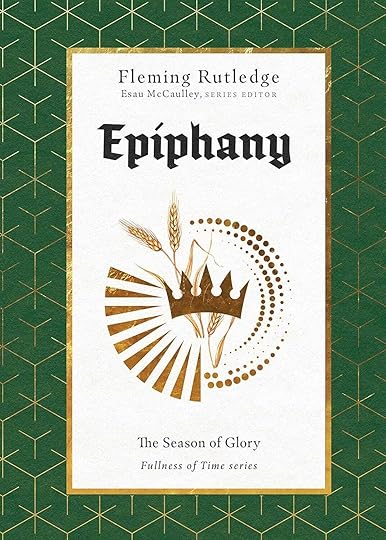
Starting Monday, 1/15 at 7:00 EST, my podcast posse and friends will be moderating a series of conversations about Fleming Rutledge’s new book.
Fleming even offered to try and join one.
It will be a Zoom Webinar.
Register here.
The link to the book is on the registration page. If you’re worried about the book arriving in time, let me know and I can get you a PDF.
 Get more from Jason Micheli in the Substack appAvailable for iOS and AndroidGet the app
Get more from Jason Micheli in the Substack appAvailable for iOS and AndroidGet the app
January 4, 2024
Our Lady of the Hostages
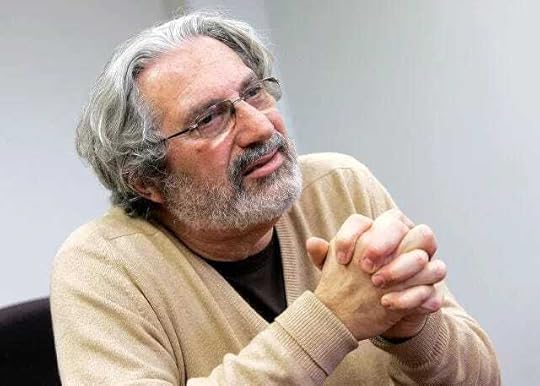
Tamed Cynic is a reader-supported publication. If you appreciate the work, consider joining the posse of paid subscribers!
Jason
One of the things I've noticed, there's an artist who has done a rendering of the Nativity scene with the rebel of Gaza around the Holy Family.
Rabbi Prof. Joseph Edelheit
and the so-called Palestinian, the original Palestinians who gave birth to the Palestinian Jew.
Jason
Yeah. So I've seen that image passed around by clergy a lot in the last few days. And it's interesting, it just struck me that there is no Our Lady of the hostages.
Merry Christmas, friends!
Here is the most recent conversation I had with my friend Rabbi Joseph Edelheit. We recorded this just before Christmas, and, in it, we discussed meta-narratives and false analogies, whether Jesus was a Palestinian rabbi, and the Hebrew Bible’s teaching and torah regarding human sexuality.
If you have a question for Rabbi Joseph, shoot me an email or leave it in the comments and we will address it in future conversations.
 Get more from Jason Micheli in the Substack appAvailable for iOS and AndroidGet the app
Get more from Jason Micheli in the Substack appAvailable for iOS and AndroidGet the app
January 3, 2024
The Star was their Golden Calf
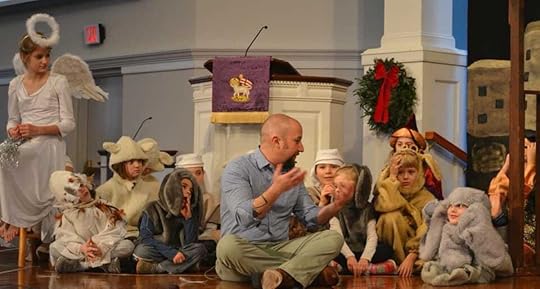
Tamed Cynic is a reader-supported publication. If you appreciate the work, consider joining the posse of paid subscribers!
Epiphany
We’re in the waning days of Christmas.
Saturday is Epiphany, the high holy day when the magi bring their gifts to the Christ child and behold him. Thus, Mary’s boy and Pilate’s victims draws the Gentile world into worship of the true God of Israel.
As a holiday, Epiphany is right up there with Ash Wednesday in terms of what it says about you and me. The name of the holiday says it all: Ash Wednesday.
Ash Wednesday says that the grime outside on your forehead matches the grime inside in you, and the wages of sin is death; ergo, from dust you came and to dust you shall return. Have a nice day.
Ash Wednesday— the takeaway for the day is built into the name.
Likewise, “Epiphany.”
Epiphany reminds us that you and I require one, an epiphany.The name says it all.Epiphany says that our situation before God is such that we cannot come to God or discover God, much less follow God or have faith in God, on our own, by our own lights, or through any innate ability that we possess.
We need an epiphany to discover the true God.
Epiphany says:
No, you cannot find the true God on the golf course.
It doesn’t matter if you’re spiritual but not religious because neither spirituality nor religion can convey the Incarnate God to you.Generic meditation cannot mediate the meaning of Christ and him crucified to you.January 2, 2024
On the Incarnation
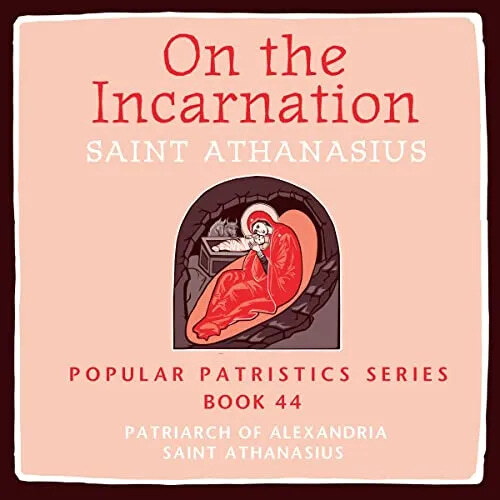
Tamed Cynic is a reader-supported publication. If you appreciate the work, consider joining the posse of paid subscribers!
For the ninth day of Christmas, I don’t have nine dancing ladies to gift you. But I do have this conversation between Joshua and I shared with Dr. Johanna, who both enjoys dancing and can cover for a dozen ladies when it comes to thoughtful conversation.
Here is the prayer Johanna offers at the top:
Heavenly Father, Most Merciful God, we're inundated with so much pressure of fake joy at this very moment and grappling with how to hear the news of your incarnation, death, and resurrection through the noise of that. And we pray that you hear us with forgiveness and grace and that you be with us in this conversation and as we move into the rest of our day that we can bring your love and light to everyone that we encounter. Through Jesus Christ our Lord. Amen.
And here is the passage from Athanasius that I read at the beginning:
“Furthermore, if the death of the Lord is a ransom for all, and by his death the wall of partition is broken down, and the call of the Gentiles is effected, how would he have called us had he not been crucified? For only on the cross does one die with hands stretched out. Therefore, the Lord had to endure this and stretch out his hands that with the one he might draw the ancient people and with the other, those of the Gentiles, and that he might join both in himself. This he himself said when he indicated by what manner of death he would ransom all men. When I shall be raised up, I shall draw all men to myself."
Merry Christmas, friends, and Happy New Year!
 Get more from Jason Micheli in the Substack appAvailable for iOS and AndroidGet the app
Get more from Jason Micheli in the Substack appAvailable for iOS and AndroidGet the app
December 29, 2023
The Line Between Faith and Madness

Tamed Cynic is a reader-supported publication. If you appreciate the work, consider joining the posse of paid subscribers!
Here is the video of a conversation Todd Littleton and I recently enjoyed with filmmaker Jesse Moss about his new documentary The Mission.
The film explores the shocking event that made headlines around the world in 2018: a young American missionary, John Chau, was killed by arrows while attempting to contact one of the world’s most isolated Indigenous peoples on remote North Sentinel Island. From Emmy-winning directors Amanda McBaine and Jesse Moss (“Boys State”) with Oscar-winning producer Simon Chinn and Emmy-winning producer Jonathan Chinn of Lightbox, comes National Geographic Documentary Films’ The Mission, which uncovers the gripping story beyond the headlines. Through exclusive interviews and with unprecedented access to Chau’s secret plans, personal diaries, and video archives, The Mission examines the mythology of exploration that inspired him, the evangelical community that supported his quest, and reveals his own father’s heartbreak as Chau’s youthful thirst for adventure became a fatal obsession.
 Get more from Jason Micheli in the Substack appAvailable for iOS and AndroidGet the app
Get more from Jason Micheli in the Substack appAvailable for iOS and AndroidGet the app
December 28, 2023
Christmas Ends in the Dark

Tamed Cynic is a reader-supported publication. If you appreciate the work, consider joining the posse of paid subscribers!
Holy Innocents Day
Several Advents ago, I spent the week before Christmas with a mission team from my church, in a poor community in Guatemala near the mountains called Cantal. I was working at my last home for the week, building my last wood-stove for my final family before making the journey home to be with my own.
Weʼd just begun working. The husband and wife of the house were busy mixing mortar. And even though here in Northern Virginia at their age theyʼd be taking the SATʼs and visiting colleges, in their part of the world they were married and busy surviving and making sure their three children did too.
While they mixed the mortar, I stepped into the doorway of their mud-block home, looking for their three little children, thinking Iʼd play with them or get them to smile or giggle or run away in pretend fear. You know, Facebook photo kinds of stuff.
It was a one-room home. Tacked on the far wall was a cracked, laminated poster of multiplication tables. In the righthand corner was a long branch from a pine tree, propped up in a pink plastic beach bucket and decorated with pieces of colored foil and plastic.
Thick smoke from a fire wafted into the room through the tin roof. Scavenged and saved bits of trash were stacked neatly on the dusty floor. The bed was a mattress laid on top of cinder blocks just to the left of the door. The three children— a three year old named Jason, a girl a year or two older named Veronica and their baby sister- were sitting on the bed. Jason didnʼt have any shoes and his feet were black with dirt and looked cold. He had a rash on his cheeks and his eyes were red and his nose was running black snot from the smoke. They were sitting on the bed and Veronica was feeding them breakfast with a toy dollʼs spoon. She was feeding them Tortrix, lime-flavored corn chips like Fritos.
Because that was the only thing they had to eat.
Because junk food is cheaper and thatʼs all they could afford.
Above the bed hung a calendar from several years earlier. It was flipped to December. The top half had a picture of Mary and Joseph and the baby Jesus. At the bottom of the picture was a scripture verse in Spanish, “...a light shines in the darkness...”
I stepped into the doorway and saw them there, the two little girls and the boy with my name, looking dirty and sick and shoeless, eating the only food they had while their mother and father worked with the kind of speed that comes from being sentenced to a lifetime of hard labor. I looked at them and I saw the baby Jesus hanging there on the wall above them. I bit my lip to keep my eyes from tearing up, and I muttered to myself, “Christ is born this?”

Despite what we sang on Christmas Eve, it was not a silent night.
Not really.
Not at all.
At least not according to Matthew.
According to scripture, sometime after the shepherds returned to their flocks and after the magi found a different route home and after Mary and Joseph wrapped him in bands of cloth and laid him in a trough, all the other mothers and fathers of sons in and around Bethlehem lay their babies in their cribs and tuck their toddlers into bed.
And while they sing them a lullaby or tell them a bible story or kiss them goodnight on the forehead, they hear:
The sound of boots stamping down the dusty roads
The sound of doors being knocked on and kicked down
The scraping sound of metal on metal as swords are unsheathed
The chaotic sounds of orders being shouted
And fathers being shoved aside
And mothers gasping
And babies being taken.
It was not a silent night, that night when Mary, whoʼd already traveled 70 miles on foot the week she delivered him, rouses her baby awake and wraps him against the cold and tells her husband to pack whatever he can.
It was not a silent night—
That night they sneak away across the border with no money to their name
That night the skies, in which the angels had sung ʻGlory to God in the highest heaven,ʼ fill with the cries of mothers and fathers as their sons are silenced forever.
It wasnʼt a silent night.
Which makes it all the more strange that when it comes to the mere mention of the word, “Christmas” triggers everything that is nostalgic and comforting and sentimental.
Yet in scripture Christmas isnʼt sentimental, not at all.In scripture— in Matthew’s Gospel, especially- Christmas is all steely-eyed recognition that this world is very often a shockingly horrible world.
Where despots plot and evil flourishes and children are victims.
Where the poor are powerless and the powerful do whatever they please to the nations they regard as backward and justify after the fact.
Christmas in scripture isnʼt like Christmas in Times Square. Itʼs not like an old-fashioned Christmas with a fire warming the hearth and a blanket of snow frosting the window outside.
Christmas, real Christmas, is light.A light shining in the darkness.And for that to be true requires the recognition that the world is not as God would have it be, that the world is often a dark place.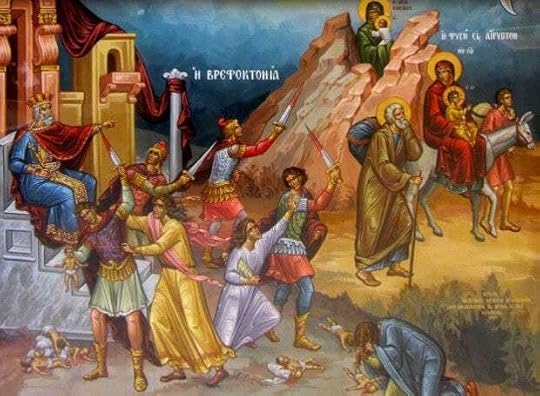
So itʼs strange how we turn Christmas into a nostalgic dream, into a sentimental escape. Because in the bible Christmas couldnʼt be more gritty and realistic. Matthewʼs and Lukeʼs Christmas stories could just as easily be reported by protestors on Twitter.
The stuff of hashtags is all there:
Thereʼs a massacre of innocent children and a world too busy to stop and notice.
Thereʼs political intrigue and the maneuverings of an empire in the Middle East.
Thereʼs the Holy Family finding themselves political refugees in an inhospitable world, finding themselves illegal aliens in a foreign land.
Thereʼs no way it was a silent night.
And somehow that never really hit home for me until that Advent morning in Guatemala, staring at Jasonʼs dirty bare feet and bloodshot eyes and black runny nose and wondering why Jesus is born at all, that it finally struck me.
When I read the Christmas story, itʼs not fair for me to read myself into the place of Mary or Joseph or the shepherds or even the wise men.
I donʼt know what itʼs like to live under the heel of an empire. I donʼt know what itʼs like to have my life jerked around by the rich and the powerful.
What I realized that Advent morning, what I realized at Jasonʼs house, is that if I have a place in this story, my place is in Rome with Caesar Augustus.Or maybe in the gated communities of Jerusalem, rubbing elbows with King Herod, Caesarʼs lackey.I mean, Iʼd rather count myself among Mary and Josephʼs family. Or at least among their friends (if they had any), waiting outside the manger with a balloon for the baby and a cigar for the father. Iʼd even settle for being one of the shepherds, whose dirty work disqualified them from religious life, but to whom the heavens nonetheless break open with angels and good news. Iʼd even take being one of the magi, unbelieving strangers from Iraq, who bring to the promised child gifts they probably couldnʼt afford.
But what I realized that Advent morning is thatʼs not my place in the story.
My place in the Christmas story is as a member of the empire.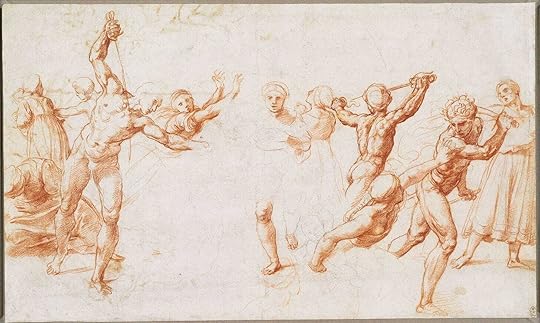
Iʼm well-off. I’m rich. I’m powerful.
Iʼm not as sophisticated as Caesar Augustus, but Iʼm the beneficiary of an expensive Ivy League education. I donʼt live in a castle but I do live in a home that a majority of the worldʼs people would call a palace. Iʼm not a king or an emperor but I have more control over my life than probably even King Herod did back in the day.
That Advent morning at Jason’s house it hit me for the first time that Iʼm not so sure I like my place in the Christmas story.
So itʼs strange.When you think about it, about who we are and where we are in the story.Itʼs strange that so many of us flock to church on Christmas.Itʼs strange that the Christmas story doesnʼt strike us as it did Herod: with fear and agitation.
I mean you have to give Herod credit. He wasnʼt stupid— maybe, even, he was smarter than us.
He knew bad news when he heard it.
He knew the ʻgloryʼ the angels sang was confirmation of the threatening song Mary had sung eight months earlier.
Herod knew that joy coming into Maryʼs world meant an attack on his world.Herod knew that when God takes flesh in Jesus, God also takes sides:
With those on margins.
With the people working the night shift and with those working out in the fields.
With the oppressed and the lowly and the refugee.
With all those whose- we have to be reminded- lives matter.
For Herod, for the white-collared and the well-off and the people at the top of the ladder, for the movers and shakers of the empire- Christmas was bad news not good news. And they were smart enough to know it.
Far be it from me to be cynical (thatʼs a joke), but I wonder if thatʼs why we drape Christmas with so much cheap sentiment. I wonder if thatʼs why at this time of the year we prefer nostalgia for a world that never was instead of a truthful recognition of the world that is or an honest longing for the world God promised will be.
I wonder if deep down we know Christmas means God may not be on our side. I wonder if in our heart of hearts we know that if we told the story straight up as Matthew tells it, then like Herod we might have a reason to fear. To fear that his birth, if we take it seriously, will turn everything in our lives upside down.
That Advent afternoon, after our weekʼs work was complete, the women of the village cooked a meal for us and thanked us. These are women who, in their lifetimes, have been victimized by dictators and armed thugs. These are refugees whose people over generations have been displaced and pushed into mountains as their land was stolen by the rich. These are poor women whose husbands and sons either have been killed by civil war or are living as economic exiles here in the states.
And there I was.
From a different world completely.
Jasonʼs 17 year old mother was there. She presented me with a little tapestry sheʼd sewn and she said into my ear, “I thank Jesus Christ for you.”
And then she wished me a Merry Christmas.
And when she said that, I muttered to myself again, “Christ was born for this.”
But this time it wasnʼt a question.
Because even though itʼs not the sentimental story we like to hear this time of year, Jesus was born for this.
Jesus was born so that someone proud like me would gladly humble himself so that a poor, humble woman like her could be filled with pride. Jesus was born so that someone rich like me would gladly empty his pockets to fill her childrenʼs bellies.
Jesus was born so that someone on the top like me would gladly take some bad news on the chin so that she could be lifted up.
Christ was born in the dark; so that, the powerless would know that God was with them in the flesh and the powerful would know that we canʼt save ourselves.
She wished me a Merry Christmas, and then she embraced me.
Given who I am and where I am in the story, to anyone else her hugging me mightʼve looked like Mother Mary embracing King Herod.There is no kingdom in this world like that other than the Kingdom that belongs to the Prince of Peace.
Thatʼs why heʼs born.
In the dark.
 Get more from Jason Micheli in the Substack appAvailable for iOS and AndroidGet the app
Get more from Jason Micheli in the Substack appAvailable for iOS and AndroidGet the app
December 27, 2023
The "With" Comes Before the "For"

Tamed Cynic is a reader-supported publication. If you appreciate the work, consider joining the posse of paid subscribers!
Since there are yet more days of Christmas, we have time to ponder a question.
I think it might be the most important question:
Would God still have come to us in Jesus if there had been no fall?
Would the eternal Son have become incarnate even if we had not sinned?
That is, if there had been no need for his cross, then would we still have gathered at his creche?
Whether we realize it or not, it’s a question we answer in the affirmative every time we name God as Father, Son, and Holy Spirit.
When we call God Trinity, we’re saying that God’s decision to be with us in Jesus Christ— God’s decision not be God without us— is eternal and therefore prior to God’s determination to be God for us on the Cross.
The with comes before the for; therefore, the with takes precedence over the for.It’s true that Jesus saves us. It’s true that his death and resurrection reconcile God’s creation. It’s true that through him our sins are forgiven, but that’s not why he comes.
The answer is so simple and straightforward it’s hiding from us in plain sight.
God comes to us in Jesus because God is Father, Son, and Holy Spirit.
That is, from before the foundation of the world, God elected not to be God without us.
Jesus comes to be with us at Christmas because he was always going come.
The incarnation only unveils what was true from before the big bang.
What we unwrap at Christmas isn’t simply a rescue package but an even deeper mystery, the mystery that the nativity is an event God set on his calendar before God created time itself.Even if there had been no need for a cross, there still would have been a creche because God has elected to be no other god than Emmanuel, God-with-us.
In other words—
Jesus is not made for us.
We are made for him.
We are the ones with whom God wants to share his life.
Thus, at Christmas, we are the gifts God gives to himself.Because before the stars were hung in the sky, before Adam fell or Israel’s love failed, God’s deepest and abiding desire is is friendship.
With us.
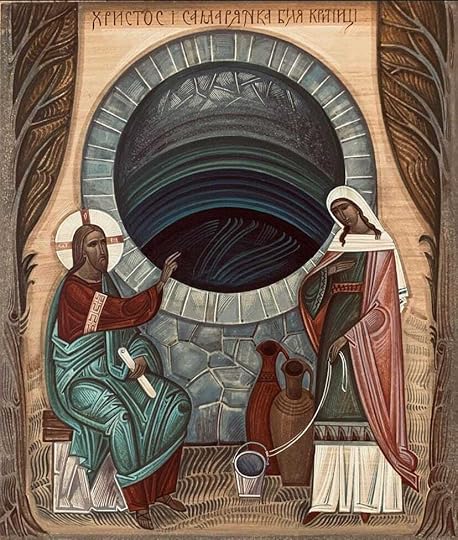
Once you understand that from before creation God elected to be God with us, for the home of God to be with mortals, then you discover that Jesus, as Emmanuel, is not part of some grander plan.
Jesus is the plan.
Emmanuel is not the means by which we gain admittance to the good place. Emmanuel, God-with-us, fully human and fully divine, the incarnate God is heaven on earth.
Jesus is the life of heaven made flesh.The ancient Christians had a catchphrase they used to think through this.
In Latin, it’s: opus ad extra, opus ad intra. That was their way of saying: Who and what God is towards us in Jesus Christ, God is eternally in himself.
If what Jesus teaches us is really the Word of God, if the Cross is in fact a perfect sacrifice for your sins, if your salvation is indeed assured, if the one born at Christmas is truly Emmanuel- God with us- and nothing less, then who and what God is in Christ on Earth, God is antecedently and eternally in himself. If Jesus is the supreme expression of God, then he must’ve always been so. Before he’s Jesus of Nazareth, in the flesh, he’s the eternal Son, in the Trinity. That’s what Christians mean when we say that Christ is pre-existent. That’s what we profess in the creed when we recite that Christ is the one “by whom all things were made.” That’s what the first Christians sang in the hymn Paul quotes in his letter to the Colossians that Christ is:
“...is the image of the invisible God, the firstborn of all creation; all things have been created through him and for him...”
He was before was was.
He’s back behind yesterday.
There is not when he was not, and there can not be when he will not be.What’s that mean?
It means the incarnation only unveils what was true from before the beginning. God’s primal, primordial, eternal decision not to be God in any other way but God-with-us. Thus, there is literally no limit to God’s love.
There can be no time at which you can exhaust God’s love for you because Jesus Christ is before time.
And so Jesus doesn’t just come to forgive us our sins. He isn’t born just to die. Because when we say that Christ is pre-existent, we say that he would’ve come anyway, that he always going to come, that even if there hadn’t needed to be a Cross there still would’ve been a cradle. Because before he brought forth light and life on Earth, God’s shaped his whole life to be Emmanuel, God-with-us.
Jesus isn’t made simply to forgive or die for our sins. Because if Christ is preexistent, then everything goes in the other direction. Jesus isn’t made for us; we were made for him.
We are the ones with whom God wants to share his life.Jesus is the reason for the season, but the reason for Jesus is that before the stars were hung in place, before Adam sinned or Israel’s love failed God’s deepest desire is, was and always will be friendship. Fellowship. With us.
 Get more from Jason Micheli in the Substack appAvailable for iOS and AndroidGet the app
Get more from Jason Micheli in the Substack appAvailable for iOS and AndroidGet the app
December 26, 2023
The "You" Means Me
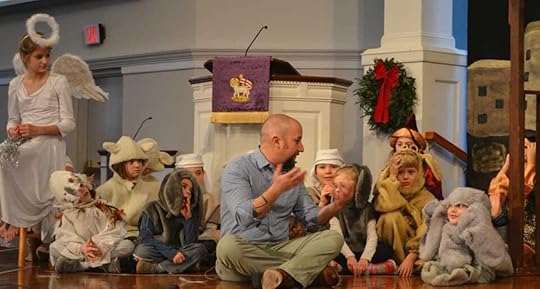
Tamed Cynic is a reader-supported publication. If you appreciate the work, consider joining the posse of paid subscribers!
Christmas Eve: Midnight Homily
Two advents ago, I sat incognito in my street clothes in the second pew from the front and I watched as three- and four-year-olds portrayed the heavenly host to the best of their ability and kindergartners dressed in shaggy browns and grays played the friendly beasts gathered at the bedside of the incarnate God.
One of the sheep, righteously angry about being thrust into such responsibility, cried angry tears where the pulpit normally stands.
“Gosh,” the man’s voice behind me said, “if I could be her age all over again, I wouldn’t make most of the decisions I’ve made … I’d do my life different if I could do it over again.”
The man was homeless.
I could feel his breath, smelling vaguely of booze, against the back of my neck.
His honest, almost reflexive declaration struck me as the perfect distillation of what we mean by the word, church.
His was a confession given freely, even winsomely, as a reaction to the gospel and in the trust that he was in a space made safe by grace.
Mary, played by a fifth grader and appearing virtually in a pre-recorded performance, appeared not only to be pondering the gravity of the annunciation but her next lines; meanwhile, the angel Gabriel delivered his glad tidings so fast you’d think there was an angel labor shortage and he had places to be.
When Gabriel announced his goods news of great joy to the shepherd petting his cottony sawhorse sheep, I heard a different voice behind me whisper to the man, “Can you imagine getting a message like that from God? Wouldn’t you love it if God said something like that to you?”
The man replied with the same astonished honesty:
“If God spoke to me, I don’t expect I’d care much what he had to say to me. Just God speaking — to me — would be enough. Shit, that’d be a miracle.”
I didn’t have to look behind me.
I could hear that he was crying.
He might have wept harder had he known how right he was.
Because, of course, it is a miracle.
The one the angels herald is Immanuel, God with us.And therefore, the God who took flesh in Mary’s womb takes up accommodations even more modest than a manger.Immanuel— the Risen Jesus— encounters us in proclamation: in word and water, wine and bread.
Just so, unlike the shepherds, you don’t need an angel. You’ve got something better than an angel. You have a preacher— You have a Preacher with a capital P.You have loaf and cup.
You have his risen body, the church.
“You know my favorite part of that story?” the man behind me said to the woman seated next to him at the pageant’s end, “The you. “For unto you is born this day…a savior.” That you means me.”
Once again, he was absolutely correct.
Because the one the angels herald is Immanuel, God with us, what the angels once said to shepherds in the past, the Lord says to you tonight.
The “you" means me.
The “you” means you.
For you, the savior is born.
The disarmed, disarming love laid in a manger is for you.
This is the Lord’s word to you.
[image error]Read null in the Substack appAvailable for iOS and AndroidGet the appDecember 24, 2023
Love Actually
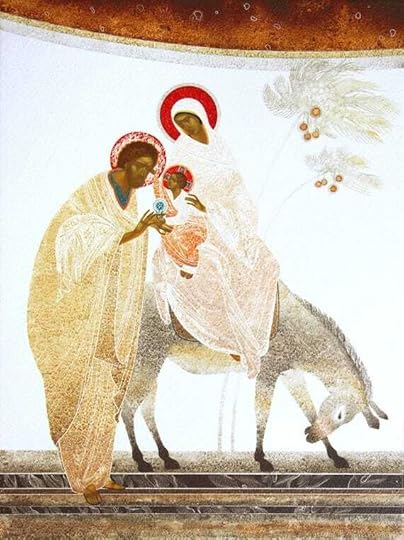
Tamed Cynic is a reader-supported publication. If you appreciate the work, consider joining the posse of paid subscribers!
Matthew 1.18-2.20
Exactly one year ago, I got a call from someone who worships with us online. Debbie told me that her father was dying in Mary Washington hospital in Fredericksburg. After several days of unresponsiveness he’d woken up at five that morning and announced unexpectedly that he wanted to speak with a Methodist minister. I took the train down on Wednesday morning to avoid the traffic on the highway.
When I got to his room, I discovered that Merle was almost completely deaf. His daughter had a stack of index cards and a supply of black sharpies. She introduced us. Because his hearing loss made our communication necessarily one way, at first I listened to him.
Merle’s initials are “MF” and he’d always liked that his initials implied that he was a bit of a hard-ass and a stoic. The persona suggested by his initials went with the purple birthmark on his bottom lip that made him look like he’d just walked away from a fight. Indeed, he told me, he’d fought in World War II, Korea, and Vietnam before settling down to carry mail.
I listened as he told me about his life and his regrets, the chief one being a wife he left for another.
“I don’t know whether or not I’m fit for heaven,” he said to me, “Do you?”
I smiled and immediately thought of that verse from the Christmas carol: “And fit us for heaven to live with thee there.”
Notice—
The final verse of “Away in the Manger” is addressed to Jesus. We’re not the ones fitting ourselves for heaven.“I don’t know if I’m fit for heaven,” Merle said to me.
“Do you know?” he asked me.
I nodded.
And I mouthed, “Yes.”
Taking that as my cue, I moved to apply the certainty of faith to him. But because of his deafness, I had to write out all my priestly parts. The words had to take flesh.
Like Sheriff Rick Grimes in Love Actually— the absolute worst Christmas movie of all time— I wrote it all out by hand in clear block letters with thick black ink. And then I numbered them. And then, standing next to his bedside, I held them up to him, one at a time, to read.
The questions came straight out of the baptism liturgy.
“#1— Merle, do you repent of all your sins?”
And he nodded as earnestly as anyone I’ve ever seen.
“#2 — Do you put your whole trust in Jesus Christ and his grace alone?”
“ I do,” Merle said like he was promising a wedding vow.
Cards #3 and #4 and #5 said, “Merle, in the name of Jesus Christ and by his authority alone, I announce to you the entire forgiveness of all your sins. Remember your baptism.”
Card #6— “And know you’re home safe in Jesus Christ. Trust in his grace.”
But the nurse standing vigil over him shot me a look of exasperation.
Or maybe outrage.
It was the Card #4 that had tightened her sphincter, “I announce to you the entire forgiveness of all your sins.”
Including the wife you left for another.
The look on the nurse’s face was as easy to read as the black sharpie’d ink on the index cards, “Where do you get off? Who are you to forgive his sins? Who are you to speak for God?”
And of course she was right to judge me wrong.
Because it’s right there in the Bible— only God can forgive sins.I have no authority to forgive them.
I have no power to promise you a future— like you, I’m not getting out of life alive; how can I possibly promise a Future.
I have no prerogative to speak for God.Unless Mary’s boy and Pilate’s victim is Immanuel.God-with-us.
God-is-with-us.
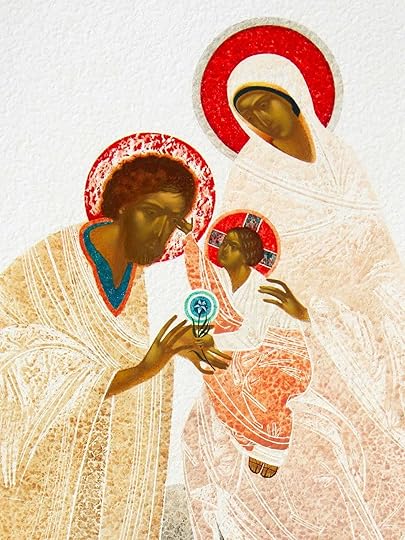
The present tense of the verb makes all the difference.
Jesus is Immanuel.
The prophecy from Isaiah was only partial, for he is more than messiah. He is Immanuel.Time and eternity intersect in him.He is the identity of your Future, yet he is present in the Present. The God-who-is-human is God-with-us. Jesus is Immanuel not Jesus was Immanuel. Jesus is Immanuel because the gospel— even on Christmas— is likewise reducible to three little words, “Christ is risen.”
And quite simply—
I do not believe Mary’s child and Pilate’s victim is alive just because the gospels report it. I know Jesus is risen because I’ve met him. Jesus lives with death behind him; therefore, he is Immanuel.
God with us.
Just so—
When we call Jesus Immanuel, we are not speaking merely or even primarily about the Friend of Sinners who lived briefly and died violently. When we refer to Christ as Immanuel, we are not even referring to the Jesus presented and proclaimed in the Gospels.
Immanuel is not the one the angels glorified.He is not the one the magi beheld.He is not the one King Herod conspired to kill.Immanuel is not the child the shepherds found swaddled in a manger, his arms bound in strips of cloth.That child died.That child died when his arms were bound once again, not in bands of cloth but outstretched on a horizontal beam, between noon and three, on a hill outside Jerusalem, the day of or the day after Passover.
Apart from Easter, the Jesus of history ends on Good Friday; thus, that Jesus is not Immanuel in any way other than as a character in a story we call Matthew.
Jesus would not be the Word without the resurrection; likewise, the Son is not Immanuel if the Father did not raise him from the dead.

When I finished writing out index cards for Merle like he was Keira Knightley and I was Sheriff Rick, I prayed with him. I shouted straight into his earball. And then I made the sign of the cross on him and I blessed him.
I blessed him. I bestowed the blessing of God on him. When I left him, he was clutching those cards like they were his ticket for a journey. At best, I’d offered Merle some helpful sentimentality. At worst, I’d lied to him.
Who am I to deliver God’s blessing?
I can’t give what only God can give.
Unless the risen Jesus is actually God with us.
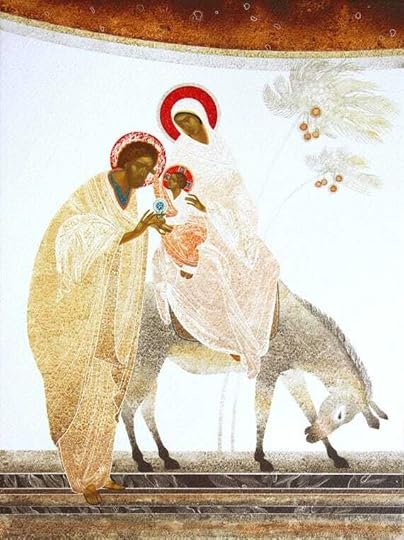
Immanuel is the risen Jesus. Immanuel is the resurrected Jesus whose body is the church as he is her head. God is with us— here.
Love with a capital L is here, actually.
As astonishing as it sounds, this is the straightforward teaching of the scriptures:
“The Father has put all things under his feet and has made Christ the head over all things for the church, which is his body, the fullness of him who fills all in all” (Ephesians 1.22-23).
We— the church, spread throughout the world— are the fullness of him.
“Jesus is the image of the invisible God, the firstborn of all creation; for in him all things in heaven and on earth were created…He is the head of the body, the church…For in that body— the church— all the fullness of God is pleased to dwell, and through that body God is pleased to reconcile to himself all things” (Colossians 1.15-20).
The church in Ukraine, the church in Gaza and in Jerusalem, the church here— the church is the body through which God is working the reconciliation of all things.
“When Christ came into the world, he said, “Sacrifices and offerings you have not desired, but a body— the church— you have prepared for me…” (Hebrews 10.5).
The church is not contingent— it is the body, picked out before Christmas, like a gift from the Father to the Son. Which means, you are a gift picked out by the Father for the Son. You don’t have to believe it— you don’t— but you cannot argue that it is not the clear and uncompromising witness of scripture.
“For wherever two or three are gathered together in my name, there I AM,” Jesus promises. We have to be conditioned by the superstitions of a secular age not to take that statement straight up— as literally the gospel truth.
It’s no spiritual metaphor.
It’s as sure and certain as math.
1+1 or 1+2 = 4
Two or three always amount to at least a fourth.
Immanuel.
Jesus is with us because the Father raised him from the dead two or three days after the Passover— two or three days.
Spoiler alert the Gospels do not actually agree on which day Jesus died.
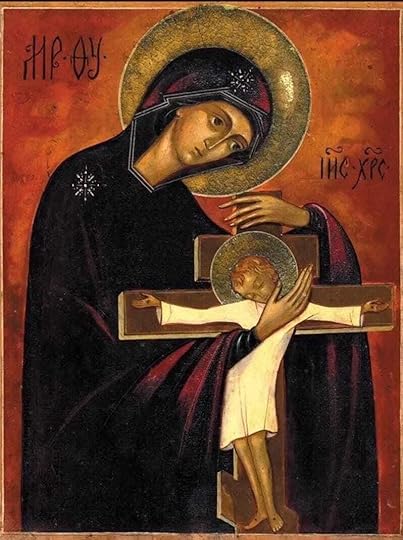
Yesterday afternoon I conducted a funeral at the Little White Church. After the worship service, out in the graveyard, I prayed the commendation, and then I watched as family members took turns with the shovel, casting earth upon Ludid’s ashes.
Once the shovel had been passed to each member of her family, it returned to her husband of a half century.
“I’m going to marry you,” he’d said when he first saw her.
“Wait for God’s will,” she’d replied.
A response that only makes sense if Jesus is Immanuel.
I stood at the head of her plot and I watched as he insisted on filling her grave, shovel by shovel. He only has three fingers on his right hand. Nevertheless!
Shovel by shovel by shovel by shovel by shovel.
Every so often, Luis would kneel in the grass to pick out the sticks and the leaves and the pebbles in the pile of exhumed dirt. As though, he wanted her to have the perfect soil for her resting place. As though, she could see. Or, as though, she would see again.
Just before he took up the shovel, I committed her to the earth, “In sure and certain hope of the resurrection.”
Sure and certain!
Sure and certain!?
The sole person who can speak authoritatively about the resurrection is the only one who has been resurrected; the only one who can unconditionally promise the future is he who lives with death behind him.
Just so, Luis’s gesture at his wife’s grave was sad and touching.
But it was not beautiful; and it was not true— unless the risen Jesus is God with us, promising through a poor preacher like me, “in sure and certain hope of resurrection to eternal life….This body we commit to the ground, earth to earth, ashes to ashes, dust to dust.”
If God did not raise Mary’s boy from the dead…
If the risen Jesus is not Immanuel— God with us…
Then, at her grave, rather than picking out twigs and leaves, we all should have stood mute, for we would have nothing to say.
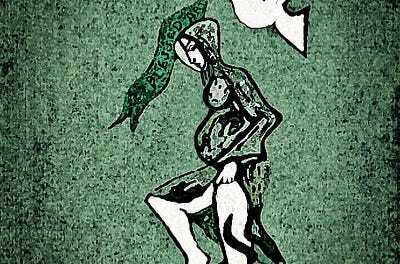
You may have noticed that the nativity according to the Gospel of Matthew makes no mention of shepherds keeping watch over their flocks by night. Matthew says not a note about choirs of angels singing in exaltation or a census decreed by Caesar in the time of Quirinius. Those features are all in Luke’s Christmas account, which includes neither the magi seeking the star from the east nor the holy family’s exodus into Egypt. For that matter, the Gospel of John’s nativity is not even a story, “In the beginning was the Word, and the Word was with God, and the Word was God.”Mark, meanwhile, skips over incarnation altogether and begins his Gospel with Jesus all grown up, just showing up in Galilee and announcing the pardon of God for sinners.
When it comes to Christmas and a good many other details, the Gospels do not agree with one another. And the discrepancies do not stop there.The Apostle Paul appears not to know the Christmas story at all nor any of Jesus’s teachings and miracles. Paul makes no mention of them in his epistles, which make up the bulk of the New Testament. And any honest reading of the Letter of James must conclude that James is at odds with Paul. And how any of it echoes and complements and culminates the Old Testament is not always— or even, often— clear.
The Gospels do not agree about the day on which Jesus died.
There are no shepherds in Matthew’s Christmas story.
There are no wise men in Luke’s.
Neither are in John’s account of the incarnation.
This is a problem if Immanuel is not the Risen Jesus.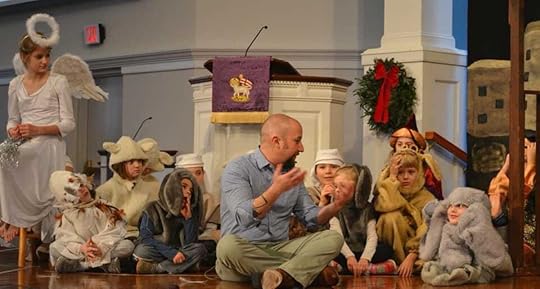
On Tuesday night, I drove to hospice to pray over Steve Reynolds with his family as he died. I’ve had a lot of days and nights like that of late. Before I prayed over Steve, I asked his family to lay hands on him and I invited them to offer their final doxologies to him. Around the bed they took their turns, speaking to him their thanks and praise— memories both funny and moving.
At the last, one of Steve’s sons said:
“I’m so proud of you, Dad. Maybe it’s odd for a child to say he’s proud of a parent, but I’m so proud of you. The man you were when I was a boy wasn’t so good. But you’re different. You became a better man. You changed. You were changed.”
It stuck me as fitting that his was the last doxology offered before the amen because the only explanation to his praise is that the Risen Jesus is Immanuel.
You were changed.
That is, Jesus changed you.
Because he is with us.

We are so familiar with the Christmas story – the story of the little donkey, the dusty road, the starry night, the cattle lowing, the series of Bethlehem hotels bursting with travelers, the tired innkeeper, the bed of straw.
Of course, none of these staple nativity ingredients are in Matthew or Luke.
None of the Christmas pageant particulars are in the Bible.
The word inn in Greek does not even refer to a hotel!
And I doubt very much it was a silent night.
This is a problem if Immanuel is not the Risen Jesus.
Everyone who stumbles over and struggles with the inconsistencies of scripture suffers from the fatal assumption that the one Matthew calls Immanuel is dead.But if Mary’s boy and Pilate’s victim lives with death behind him, if the resurrection does not mean he was transferred into eternity, if he remains an active agent in time and space, if we are his body— if he is Immanuel— then, certainly, he can use inconsistent, incomplete texts to identify himself.
If he is Immanuel, then Matthew’s and Luke’s divergent memories are no more obstacle to his self-identification than bread and wine. If Jesus is risen— if he is alive and at work amongst us— then, of course, we can trust him to use the lapses and biases of the tradition about him to reveal himself.
He can use the canon and the creed.
He can use water and words, loaf and cup.
He can issue absolution through a C+ preacher like me.
And he can walk about in a body like this one to transform sinners into saints.
You were changed.
Thus—
Isaiah: “For unto us a child is born, unto us a son is given,” if that identifies Jesus it is because the risen Jesus tells it about himself.
Just so—
He is Immanuel.
Not because I say so.
Not because Matthew says so.
But because he is saying so.
For in that body all the fullness of God is pleased to dwell.
So come to the table.
He’s made it as simple and black-and-white as sharpie on a card, “This is my body gifted for you.”
Come to the table.
The Love with which you are loved…
The Love which holds the stars in the sky, Saturn in its rings, and the sea in its depths— that Love is here, actually.
Immanuel.
 Get more from Jason Micheli in the Substack appAvailable for iOS and AndroidGet the app
Get more from Jason Micheli in the Substack appAvailable for iOS and AndroidGet the app
Jason Micheli's Blog
- Jason Micheli's profile
- 13 followers



